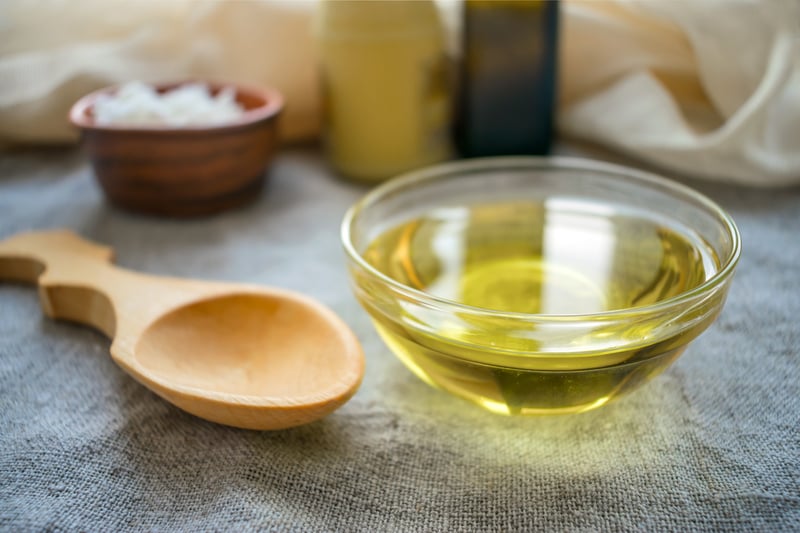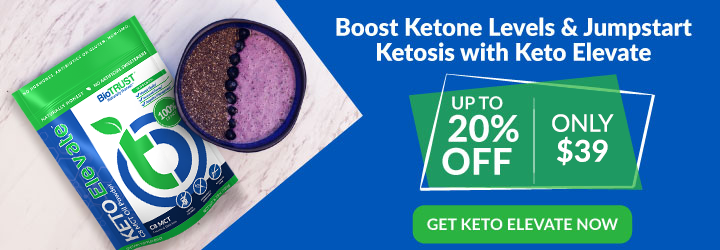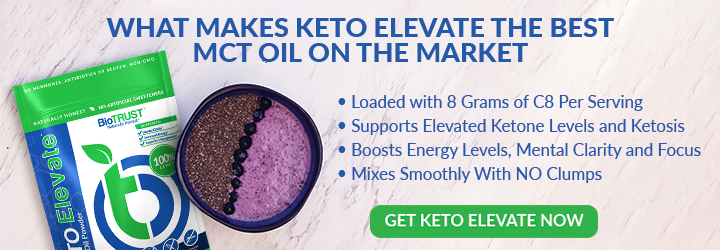MCT Oil: What It Is, Benefits & How to Use It

With benefits like increased energy, appetite control, and support for a ketogenic diet, MCT oil has become one of the most popular trending oils. It’s found in coconut and palm oil as well as some supplements, but what is MCT oil? Does it live up to the hype? And if so, how do you use it to get the best results?
Let’s dive into the research to find out…
What is MCT Oil?
MCTs or medium-chain triglycerides are a type of fat. Omega-3 fatty acids found in fish oil (i.e., EPA and DHA) are polyunsaturated fats that are well-known for their health benefits. On the other end of the spectrum are the saturated fats often found in meat and dairy products. While they’re typically considered less healthy, they also have their own health benefits.
Within this spectrum of fats is MCT oil. While it’s derived from saturated fat sources (such as coconut or palm oil), it’s different. The most commonly consumed fatty acids are long-chain (i.e., containing 13 to 21 carbon atoms), medium-chain fatty acids, on the other hand, contain six to 12 carbon atoms. (Short-chain fatty acids contain fewer than six.)
Those differences in length help explain MCT’s benefits. For example, the differences appear to make MCT oil easier to digest than long-chain fatty acids, so it can provide energy quickly.
MCT oils come in different forms as well. The main ones worth noting are C6 (caproic acid), C8 (caprylic acid), and C10 (capric acid). (Note: any products that contain C12 or lauric acid can’t accurately be called MCTs.)
What are the Benefits of MCT Oil?
While MCT oil can be found in foods like coconut or palm oil, butter, yogurt, and cheeses, only a small amount of the fats found in those foods are MCT oil (around 55% for coconut oil and only 8 to 9% in dairy fats). So, to get the benefits of MCT oil, supplementation with 100% MCT oil is typically recommended.
What are the potential benefits? Great question!
1. May Support Weight Loss
One of the most popular reasons to supplement with MCT oil is because of its potential to help increase satiety to keep hunger at bay, which could help support weight loss or maintenance. One study, for example, found overweight men who had 20 grams of MCT oil as part of their breakfast later ate less calories at lunch when compared to men who had 20 grams of corn oil with breakfast. MCT oil also led to a lower increase in triglycerides and glucose after eating, which would explain why the men ate less later—they were more satiated after the meal. 1
Other research indicates that MCT oil may increase thermogenesis. This simply means that the body burns more calories through heat. This can also support weight loss; however, at this time, the research is limited, and more is needed to confirm how effective MCT oil is. 2
2. May Increase Energy Levels
As an immediate source of readily available energy, MCT oils are one of the most efficient forms of energy for the brain. This may help not only increase energy levels but boost brain functioning and concentration, especially for people who are in a fasting state or who are following a low carbohydrate diet. 3,4
3. May Support Endurance
Getting ready for a long, hard workout—say a run, grueling bike ride, or intense bootcamp? MCT oils may help by reducing lactate levels within muscles (which is a marker for fatigue). For example, in one study, athletes who supplemented with six grams of MCT before exercise experienced lower rates of perceived exertion. In other words, they felt like their bodies didn’t have to work as hard, so they could push it harder for longer. 5
4. May Reduce Bloating or GI Symptoms
Gut health is vital to brain functioning, metabolism, and healthy immune functioning. MCT oil has been found to help control unhealthy bacterial or yeast overgrowth in this sensitive system. In turn, it may help protect against diarrhea, bloating, and other uncomfortable gastrointestinal symptoms. 6,7
5. May Support Heart Health
While more research is needed, MCT oils have also been shown in some studies to help improve serum lipid profiles. In turn, this could help prevent or fight metabolic syndrome and thus help protect heart health. 8
How to Use MCT Oil?
The first step is to pick an MCT Oil that’s of the highest quality: one that provides the most powerful form of MCT Oil (C8 or caprylic acid), that mixes easily, is easy on the digestive system, and can blend well without a blender.
It’s also worth finding a brand that doesn’t contain unhealthy additives like maltodextrin, corn, soy, or wheat-based fillers, filler oils (i.e., omega-6 fats), solvents, or artificial sweeteners or flavors.
One such product is Keto Elevate™, a high-quality MCT Oil Powder that mixes easily and conveniently into virtually any recipe or beverage. Simply add a scoop to your favorite:
- Coffee
- Tea
- Hot chocolate
- Protein shake
- Smoothie
- Fat bomb
- Yogurt
- Baked good
- And more for a delicious, creamy boost of functional fats.
You may, however, want to start with a smaller serving and increase to a full serving as your digestive system gets used to the increase in fat.







